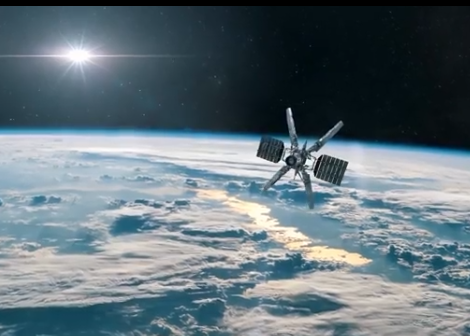If you think about the view we have of the Earth from satellites, we're able to observe the oceans, the atmosphere, changes in the land.
想想如果我们从卫星上看到地球,我们能够观察到海洋、大气、土地的一切变化。
We have amazing views of the global changes.
我们对全球变化的看法会大不相同。
Traditionally, the goal has been to build satellites to last as long as possible, and to make sure they have all the technology to operate in the dangerous environment of space.
传统上,我们的目标是建造尽可能留存的卫星,并确保它们拥有在危险的太空环境中运行的所有技术。
Everything in space is going very fast.
太空中的一切都发展得非常快。
Astronauts who travel on the Space Station, they're traveling about 17,500 miles per hour.
在空间站旅行的宇航员,他们的时速约为17500英里。
Because everything in space is traveling so fast, even when small objects hit each other, it means that they're likely to have a very dangerous collision.
因为太空中的一切都走得如此之快,即使小物体相互撞击,也意味着很可能发生非常危险的碰撞。
Very small objects have hit parts of the Space Station.
非常小的物体已经击中了空间站的一部分。
And even a very small fleck of paint, or a lens cap that was dropped off a satellite can cause major damage, because everything's moving so quickly.
即使是一个非常小的油漆斑点,或一个从卫星上掉下来的镜头盖,也会造成重大损害,因为一切都在快速移动。
Now the challenge is, in just about 50 or 60 years, we've produced industrial waste in space.
现在我们面临的挑战是,在大约50或60年内,我们已经在太空中产生了工业废物。

Just a few countries have played a key role in both putting up these major satellites, but also testing to see if they can destroy their own satellite in orbit.
仅仅是几个国家就发挥了关键作用,探索了一些主要的卫星,也测试了他们是否能在轨道上摧毁自己的卫星。
This created space debris. Sustainability is about whether or not we create and manage waste.
这就造成了空间碎片。可持续性是关于我们是否要创造和管理废物。
One of the ideas we have to consider is what do we do with the satellite when it finishes its life, its mission?
我们必须考虑的是,当卫星的生命结束,完成它的任务时,我们该怎么办?
The reality is, we have sustainability challenges on Earth and in space today, we need to look at them as a set of common related problems.
现实情况是,我们今天在地球上和太空中都面临可持续性的挑战,我们需要把它们看成一组共同的相关问题。
We have to ask the question, will we respect the rights of people and the environment as we go forward in space?
我们必须问一个问题,当我们在太空中前进时,我们会尊重人和环境的权利吗?
When we launch satellites and rockets to space, we're often carrying really expensive goods and systems, basically robots, that operate in space for maybe a decade or so.
当我们向太空发射卫星和火箭时,我们往往携带着非常昂贵的货物和系统,基本上是机器人,在太空中运作可能十年左右的时间。
And the goal has been, because launch has been so expensive, to try to not launch a new thing until the old one is just replaced.
发射一直是如此昂贵,我们目标一直是试图不发射新的东西,直到旧的东西被替换掉。
Now, the challenge we have is to say what do you do with the old one?
现在,我们面临的挑战是,你该如何处理旧的那个?
Sometimes the satellites are low enough to the Earth that they can actually be brought back down safely, and they actually enter the atmosphere.
有时卫星离地球足够低,它们实际上可以被安全地带下来,而且它们实际上进入了大气层。
They're going so fast, they burn up, and generally that's a safer way to destroy them.
它们的速度太快了,它们会燃烧起来,一般来说,这是一个比较安全的销毁方式。
But some satellites are operating pretty far away from the Earth.
但是有些卫星在离地球相当远的地方运行。
There's an area called the geostationary belt.
有一个区域叫做地球静止带。
It's about 36,000 kilometers away from the surface of the Earth.
它离地球表面大约有36000公里远。
We have a whole ring of old trash satellites that are operating just a little beyond this very useful orbit.
我们有一整圈旧的垃圾卫星,它们在这个非常有用的轨道之外运行。
And it's a concern because going forward, we don't know a way to destroy those or use them safely.
有一个令人担忧的问题,在未来,我们不知道有什么方法可以摧毁这些卫星或安全地使用它们。
As you send up new missions, we are going to see more concerns about objects creating the possibility of collisions, and they create debris that can be endangering other missions.
当你送上新的任务时,我们将看到更多关于物体产生碰撞的可能性的担忧,它们产生的碎片可能会危及其他任务。
How do we make innovation, both in policy and technology, to make Earth and space more sustainable in the future?
我们如何在政策和技术方面进行创新,以使地球和空间在未来更加可持续?
One example of how we address this topic is asking how we can use beeswax and candle wax as fuels for satellites.
我们解决这个问题的一个例子是思考我们如何使用蜂蜡和烛蜡作为卫星的燃料。
Many fuels for satellites in the past have been expensive, but also toxic to humans.
过去用于卫星的许多燃料都很昂贵,也对人类有毒。
So examples like hydrazine, if you use them for part of a satellite mission, they're both dangerous for you to handle as a human, but they also create a need for special equipment and safety features that make the whole mission more expensive.
因此,像肼这样的材料,如果把它们用于卫星任务的一部分,作为一个处理它的人来说很危险,它们有对特殊设备和安全功能的需求,使整个任务更加昂贵。
Many of the smaller satellites that are being proposed now for missions like communication systems, don't have systems for propulsion, meaning they don't have fuel to move themselves around in space.
许多现在被提议用于通信系统等任务的小型卫星,没有用于推进的系统,这意味着它们没有燃料在太空中运行。
And sometimes university teams and new countries want to have a simple satellite, and they just avoid having any kind of fuel at all.
有时大学团队和国家希望有一个简单的卫星,他们避免需要有任何形式的燃料。
Beeswax is a global product.
蜂蜡是一种全球产品。
Wax can be an important economic resource, and it's sold for many products around the world.
蜡可以是一种重要的经济资源,它可以用来出售给世界各地的许多产品。
But we want to ask can we create a marketplace, a sustainable marketplace, for beekeepers to be able to use their wax, both for other tools, such as, used often in things like health products, but also for sustainable satellite and fuel systems that can remove space debris.
但我们想问,我们能否创造一个市场,一个可持续的市场,让养蜂人能够使用他们的蜡用于其他用途,例如,制作健康产品等东西,也用于可持续的卫星和燃料系统,可以清除空间碎片。
The use of wax-based fuel systems, which are both affordable and non-toxic, could help with deorbiting the satellite, meaning, at the end of a mission, you could use this wax-based fuel system to help bring the satellite close to Earth's atmosphere.
使用蜡基燃料系统,既实惠又无毒,可以帮助卫星脱离轨道,也就是说,在任务结束时,你可以使用这种蜡基燃料系统,帮助卫星接近地球大气层。
And that's a place where it's safe for it to burn up in the atmosphere and be destroyed.
而这是一个可以让它在大气层中安全燃烧并被销毁的地方。
So it won't become a source of debris or trash in the future.
所以它不会在未来成为碎片或垃圾的来源。
Space is the heritage of all humankind.
太空是全人类的遗产。
Imagine life for a team of people who start to live on the moon, perhaps working in some way, or on Mars.
想象一下一个团队,他们开始在月球上生活,也许以某种方式工作,或者在火星上生活。
For those teams, what if we could design a system that was sustainable from the beginning, we really should ask the question how can all of our food, and water, and materials can be part of a closed system to reuse all the material we have.
对于这些团队来说,如果我们想设计一个从一开始就可持续的系统,我们应该问这样一个问题,我们所有的食物,和水,以及材料如何能够成为一个封闭系统的一部分来重新利用我们拥有的所有材料。
And if we can design ways to live without waste in space, we can also bring some of those same innovations back to Earth, and try to undo some of the damage we're doing with waste currently.
如果我们能够设计出在太空中不留下垃圾的生活方式, 我们也可以将其中一些相同的创新带回地球,并试图消除我们目前在垃圾方面带来的一些损害。













